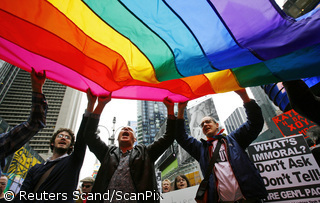Survivors and families of the 852 victims of the 1994 sinking of the "Estonia" car ferry in the Baltic Sea marked the 10th anniversary of the tragedy
Published:
30 September 2004 y., Thursday
Survivors and families of the 852 victims of the 1994 sinking of the "Estonia" car ferry in the Baltic Sea marked the 10th anniversary of the tragedy, calling for a new investigation into the cause of Europe's worst post-war maritime disaster.
Ceremonies were held in Sweden, Finland and Estonia, the countries hardest hit by the catastrophe that claimed victims from 17 different nations.
The Estonia sank on the night of September 27-28, 1994 off Finland's southwestern coast during a crossing from Tallinn to Stockholm. Only 137 of the 989 passengers and crew on board survived.
In Stockholm, the Foundation of the Estonia Victims and their Relatives, known by its Swedish acronym SEA, held a demonstration where members rejected the conclusions of the final investigation report and urged the Swedish government to launch a new inquiry.
Nearly 500 of those who perished were Swedish.
A joint Swedish-Finnish-Estonian commission concluded in 1997 that "weak locking devices of the bow visor" door, which had provided an entry point for cars and trucks to roll onto the ferry, had been the main cause of the tragedy.
When the locks ruptured, the outer bow door was ripped off and heavy seas gushed in, destabilizing the ship, according to the official report.
Swallowed by the sea in less than 50 minutes, the ship still lies at a depth of 80 meters (265 feet), a watery grave for the hundreds of people trapped inside the vessel when it went down.
Šaltinis:
AFP
Copying, publishing, announcing any information from the News.lt portal without written permission of News.lt editorial office is prohibited.
The most popular articles
 Tiwonge Chimbalanga and Steven Monjeza are married, but in Malawi homosexuality is banned.
more »
Tiwonge Chimbalanga and Steven Monjeza are married, but in Malawi homosexuality is banned.
more »
 The World Bank today launched the fourth book in the critically acclaimed Moving Out of Poverty series, which provides bottom up perspectives on poverty and local realities by over 60,000 people living in 500 communities in 15 countries.
more »
The World Bank today launched the fourth book in the critically acclaimed Moving Out of Poverty series, which provides bottom up perspectives on poverty and local realities by over 60,000 people living in 500 communities in 15 countries.
more »
 Ten years ago, European leaders pledged to end poverty in the EU by 2010. As this deadline approaches, the goal is still some way off.
more »
Ten years ago, European leaders pledged to end poverty in the EU by 2010. As this deadline approaches, the goal is still some way off.
more »
 For many 2009 will be a historic year with the coming into force of the Lisbon Treaty, the outcome of the Copenhagen summit and the inauguration of the first black US president.
more »
For many 2009 will be a historic year with the coming into force of the Lisbon Treaty, the outcome of the Copenhagen summit and the inauguration of the first black US president.
more »
 Not answering the phone, celebrating Hogmanay and reading Dickens' Christmas Carol are just three seasonal traditions that MEPs shared with us.
more »
Not answering the phone, celebrating Hogmanay and reading Dickens' Christmas Carol are just three seasonal traditions that MEPs shared with us.
more »
 More and more people make their homes and own property in EU countries other than the one in which they hold citizenship.
more »
More and more people make their homes and own property in EU countries other than the one in which they hold citizenship.
more »
 European Parliament President Jerzy Buzek has made an televised Christmas and New Year address to European citizens, looking ahead to the challenges of the coming year.
more »
European Parliament President Jerzy Buzek has made an televised Christmas and New Year address to European citizens, looking ahead to the challenges of the coming year.
more »
 Lithuania takes the 1st position in the EU by the number of students in the country.
more »
Lithuania takes the 1st position in the EU by the number of students in the country.
more »
 Sergei Kovalev, former political prisoner turned activist for Russian human rights group Memorial gave an emotional and heartfelt address to the European Parliament on Wednesday 16 December.
more »
Sergei Kovalev, former political prisoner turned activist for Russian human rights group Memorial gave an emotional and heartfelt address to the European Parliament on Wednesday 16 December.
more »
 Strengthened passenger rights for travel by bus are an important item on the agenda when the Transport, Telecommunications and Energy Council (TTE) meets on 17–18 December.
more »
Strengthened passenger rights for travel by bus are an important item on the agenda when the Transport, Telecommunications and Energy Council (TTE) meets on 17–18 December.
more »